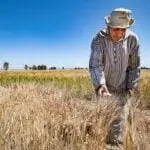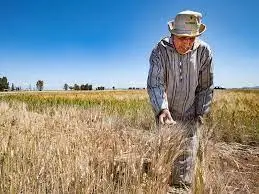No products in the cart.

Discovering Crop Science: A Comprehensive Guide for Beginners
Crop Science: Unveiling the Secrets of Agricultural Success
Crop science is an essential field that impacts our daily lives in more ways than we realize. From the food we eat to the clothes we wear, understanding crop science is crucial for ensuring a sustainable future. In this comprehensive guide, we’ll explore the fascinating world of crop science, breaking down complex concepts into simple, digestible pieces of information. By the end of this article, you’ll have a newfound appreciation for the science behind agriculture.

Table of Contents
| Sr# | Headings |
|---|---|
| 1 | Introduction to Crop Science |
| 2 | Importance of Crop Diversity |
| 3 | Crop Breeding and Genetic Modification |
| 4 | Understanding Soil Health |
| 5 | Pest and Disease Management |
| 6 | Modern Agricultural Techniques |
| 7 | Sustainable Agriculture Practices |
| 8 | The Role of Technology in Crop Science |
| 9 | Future Trends in Crop Science |
| 10 | Conclusion |
| 11 | FAQs |
Introduction to Crop Science
Crop science is the study of plants and their environments, with a focus on improving agricultural productivity and sustainability. It encompasses various disciplines such as genetics, soil science, entomology, and agronomy. At its core, crop science aims to develop techniques and technologies that maximize crop yields while minimizing environmental impact.
Importance of Crop Diversity
Crop diversity is crucial for maintaining food security and adapting to changing climates. By growing a variety of crops, farmers can reduce the risk of crop failure due to pests, diseases, or adverse weather conditions. Additionally, diverse crops contribute to a balanced diet and support local economies.
Crop Breeding and Genetic Modification
Crop breeding involves traditional methods like selective breeding to develop plants with desirable traits such as higher yield or resistance to diseases. Genetic modification, on the other hand, uses biotechnology to enhance specific traits like drought tolerance or nutritional content. These advancements have revolutionized agriculture but also sparked debates regarding their safety and ethical implications.
Understanding Soil Health
Soil health is vital for sustainable crop production. Healthy soils support plant growth by providing nutrients, water, and a stable root environment. Techniques like crop rotation and cover cropping help maintain soil fertility and structure, reducing the need for chemical fertilizers and pesticides.
Pest and Disease Management
Pest and disease management is essential for protecting crops from threats that can reduce yield and quality. Integrated Pest Management (IPM) strategies combine biological, cultural, and chemical methods to control pests while minimizing environmental impact.
Modern Agricultural Techniques
Advancements in modern agricultural techniques include precision farming, which uses technologies like GPS and sensors to optimize planting, irrigation, and fertilizer application. This precision reduces waste and maximizes efficiency, making farming more sustainable.
Sustainable Agriculture Practices
Sustainable agriculture practices aim to meet current needs without compromising future generations’ ability to do the same. This includes practices like organic farming, conservation tillage, and agroforestry, which promote soil health, biodiversity, and water conservation.
The Role of Technology in Crop Science
Technology plays a crucial role in advancing crop science. From drones and satellites for monitoring fields to artificial intelligence for predicting crop diseases, these innovations help farmers make informed decisions and improve productivity.
Future Trends in Crop Science
The future of crop science looks promising with ongoing research into climate-resilient crops, gene editing technologies, and sustainable agricultural practices. These advancements aim to tackle global challenges like food security and environmental sustainability.
Conclusion
In conclusion, crop science is a dynamic field that continues to evolve with new discoveries and technologies. By understanding the principles of crop science, we can ensure a future where agriculture is productive, sustainable, and resilient.
FAQs
What are some common pests that affect crops?
Common pests include aphids, caterpillars, and beetles. These pests can damage crops by feeding on leaves, stems, or roots, reducing yield and quality.
How does crop rotation benefit soil health?
Crop rotation helps maintain soil fertility by alternating crops that have different nutrient needs. It also disrupts pest cycles and reduces soil erosion.
What is precision farming?
Precision farming uses technology to optimize crop production by analyzing data on soil conditions, weather patterns, and crop growth. This helps farmers make informed decisions and maximize efficiency.
Are genetically modified crops safe to eat?
Genetically modified crops that have been approved by regulatory agencies are considered safe to eat. They undergo rigorous testing to ensure they are as safe and nutritious as their conventional counterparts.
How can sustainable agriculture help mitigate climate change?
Sustainable agriculture practices like agroforestry and conservation tillage can help sequester carbon in the soil and reduce greenhouse gas emissions, contributing to climate change mitigation.
Go and turn on towards organic farming to save future and thire save childs:
Elevate Plant Growth with Premium Bone Powder – Buy Now!
Organic Cow Dung Compost: Transform Your Garden Naturally
Premium Humic Acid for Healthy Plants | Enhance Soil & Boost Growth
Boost Plant Growth Naturally with Mustard Cake | Organic Fertilizer
Transform Your Garden with NPK Fertilizer | Boost Growth by 30%
Premium Perlite for Enhanced Gardening | Buy Now
Live Earthworms with Enhance Your Garden (soil health)
1 Neem Khali: Unveiling the Wonders of Nature
1Transform your garden with vermiwash-buy now
1 Premium quality Vermicompost [ केचुआ खाद ]
Follow us:
Tagged Incrop science



